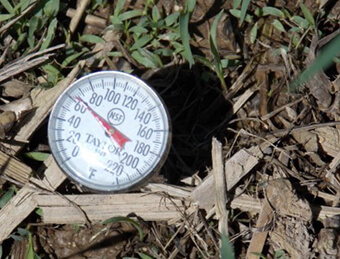What To Consider About Soil Temps at Planting
Apr 06, 2020

With a mild winter behind us and spring getting started, the state’s current five-day soil temperature average, as of March 30, is 63 degrees.
Corn needs a soil temperature of 50 degrees to germinate; while soybeans will also germinate at this temperature, emergence will be slow and could take up to three weeks.
For corn, soil temperatures that are bordering 50 degrees may become a problem if a chilling rain travels through 24 to 48 hours after planting. During that two-day period, a corn seed goes through the imbibition process, absorbing half of its weight in water. A temperature drop during this time result in imbibition chilling, damaging seed cells and causing stunting or death.
Even though soybeans germinate and grow best at a soil temperature of 77 degrees, there is no way we could wait for the soil to warm up before planting. Since we typically plant soybeans in soil bordering on the ideal germination temperature, a good seed treatment is a definite, especially considering that rain with a temperature drop could slow germination down even more and cause the seed to be more susceptible to seedling diseases. Still, don’t get in too big of a rush to plant, as Tennessee weather will always throw us some cold days between now and the middle of April. Fields that have a good cover crop will usually be a few degrees cooler, but soil temperature will stay more consistent if there were a cold day or two.
Tennessee’s average annual rainfall is 48 inches; since Jan. 1, we are currently averaging 20 inches. While soil moisture is needed for germination, excessive soil moisture at planting will cause side wall compaction which will lead to nutrient- and water-availability issues for the entire season.
If you’d like more information about soil temperatures during planting, contact your local Co-op.
Corn needs a soil temperature of 50 degrees to germinate; while soybeans will also germinate at this temperature, emergence will be slow and could take up to three weeks.
For corn, soil temperatures that are bordering 50 degrees may become a problem if a chilling rain travels through 24 to 48 hours after planting. During that two-day period, a corn seed goes through the imbibition process, absorbing half of its weight in water. A temperature drop during this time result in imbibition chilling, damaging seed cells and causing stunting or death.
Even though soybeans germinate and grow best at a soil temperature of 77 degrees, there is no way we could wait for the soil to warm up before planting. Since we typically plant soybeans in soil bordering on the ideal germination temperature, a good seed treatment is a definite, especially considering that rain with a temperature drop could slow germination down even more and cause the seed to be more susceptible to seedling diseases. Still, don’t get in too big of a rush to plant, as Tennessee weather will always throw us some cold days between now and the middle of April. Fields that have a good cover crop will usually be a few degrees cooler, but soil temperature will stay more consistent if there were a cold day or two.
Tennessee’s average annual rainfall is 48 inches; since Jan. 1, we are currently averaging 20 inches. While soil moisture is needed for germination, excessive soil moisture at planting will cause side wall compaction which will lead to nutrient- and water-availability issues for the entire season.
If you’d like more information about soil temperatures during planting, contact your local Co-op.